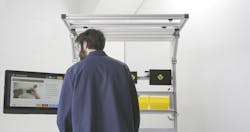In an effort to accelerate the adoption of the Internet of Things (IoT) across manufacturing operations, Tulip has created a “toolkit” that serves as building blocks for the digital factory.
The company, which last year introduced its Manufacturing App Platform—a code-free development environment—recently extended that software with a turnkey offering that allows anyone to easily build manufacturing applications. The existing Tulip Manufacturing App Platform enables engineers to build IoT apps for a variety of use cases, including interactive work instructions, automatic data collection, quality control, audits, machine monitoring and training.
Tulip’s new Factory Kit, introduced last month at Hannover Messe, builds upon the Manufacturing App platform and is designed to be a quick-start kit for powering digital manufacturing applications. It bundles cloud software, an IoT gateway, multiple plug-and-play sensors, a light kit, break beam, barcode scanner, foot pedal, analytics and out-of-the-box apps.
“The core concepts within Tulip as an organization and within our products is speed,” said Tulip co-founder Rony Kubat. “The Factory Kit is the product embodiment of that.”
To that end, engineers can use the toolkit to collect data and drive digital transformation initiatives without relying on IT or third party integrators. It empowers shop floor engineers through a do-it-yourself platform that allows them to define what “digital” means for their operations.
“This is a paradigm shift in the way manufacturing technology gets designed and adopted,” said Saul Lustgarten, head of product marketing for Tulip. “Usually, digital transformation initiatives happen from the top-down, dictated by high-level executives removed from operations. This results in massive projects that take a long time to complete. Due to their high cost, iterations are slower and thus you can't continuously improve your systems. We've identified this pain point again and again with shop-floor engineers, so our approach is bottom-up. We build tools for them to define what paper-based processes make sense to digitize and use our tools to [quickly] go from prototype to production."
The software can also augment the way factory floor operators work by providing communication tools to push their ideas upstream to engineering. “It can be as simple as adding a comment to a step directly through the app,” Kubat said.
It can also provide the workforce with greater visibility across the production line. For example, information on quality inspections happening downstream can be reported back to the operator working on the line so that they can take a different action if there’s an issue.
Available now, Factory Kit costs $3,500, including a one-on-one consultation with a Tulip expert.

